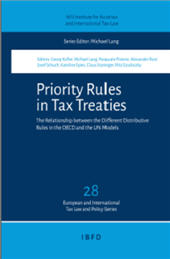Priority rules in tax treaties : the relationship between the different distributive rules in the OECD and the UN models
xxii, 389 p.
Includes bibliographical references.
Thus far, the priority relations between the different distributive rules of the OECD and UN Models have not been comprehensively studied in academia. Nevertheless, the questions of demarcation between the individual provisions are of central importance for the application of a tax treaty. The right of source states to tax and the question of which method is applicable for avoiding double taxation depends on this determination. In some instances, explicit priority rules regulate which distributive rule shall take precedence in the event of overlapping scopes of application between two (or more) distributive rules. Other relations are not specifically dealt with in the OECD and UN Models and are implicit. In both cases, interpretive challenges arise that can only be resolved through intensive analyses of the distributive rules in question.
This book aims to provide in-depth analyses of current issues concerning the relations between various distributive rules. The topics covered include: - the role of and the relationship between the distributive rules in tax treaties; - the relevance of article 7(4) of the OECD and UN Models; - the relevance of article 10(4), article 11(4) and article 12(3) of the OECD Model; - the relationship between article 12A and article 12B of the UN Model and the other distributive rules of the UN Model; - the different distributive rules for capital gains (article 13 of the OECD Model) and for taxes on capital (article 22 of the OECD Model) and their relation to the other distributive rules of the OECD Model; and - the different distributive rules of the OECD Model Convention on Estates, Inheritances and Gifts. [Publisher's text]
Collected essays.
1016876 characters
-
Información
ISBN: 9789087228491



 EPUB
EPUB